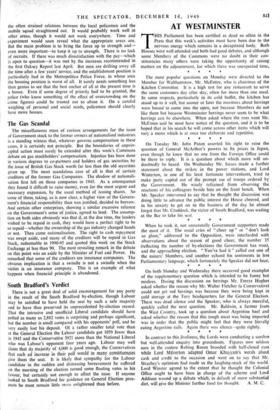AT WESTMINSTER
THIS Parliament has been certified as dead so often in the Press that this week's activities must have been due to the nervous energy which remains in a decapitated body. Both Houses were well attended and both had good debates, and although some Members of the Commons were no doubt in their con- stituencies many others were taking the opportunity of raising matters on the adjournment, for which there was unexpected time.
* * • * .
The most popular questions on Monday were directed to the Member for Walthamstow, Mr. McEntee, who is chairman of the Kitchen Committee. It is a high test for any restaurant to serve the same customers day after day, often for more than one meal. In some respects, particularly in its cold buffet, the kitchen has stood up to it well, but sooner or later the murmurs about herrings were bound to come into the open, not because Members do not like them but because Westminster herrings never seem to be what herrings can be elsewhere. When asked where the roes went Mr. McEnteo said he must have notice of the question, and it is to be hoped that in his search he will come across other items which will vary a menu which is at once too elaborate and repetitive.
* * * * On Tuesday Mr. John Paton asserted his right to raise the question of General McArthur's powers to fix prices in Japan, even though he knew that no one from the Foreign Office could be there to reply. It is a question about which more will un- doubtedly be heard. On Wednesday Mr. Isaacs made a further statement about the strikes in the power stations, and Lord Winterton, in one of his least fortunate interventions, tried to make party capital out of the prompt use of troops ordered by the Government. He wisely refrained from observing the reactions of his colleagues beside him on the front bench. When Mr. Speaker intervened to say that he thought the discussion was doing little to advance the public interest the House cheered, and in his anxiety to get on to the business of the day he almost forgot that Mr. Craddock, the victor of South Bradford, was waiting at the Bar to take his seat.
* * * *
When he took it, not unnaturally Government supporters made the most of it. The usual cries of " cheer up " or " don't look so glum," addressed to the Opposition, were interlarded with observations about the season of good cheer, the number 35 (reflecting the number of by-elections the Government has won), and the approaching election. " You've had it " called out one of the miners' Members, and another echoed his sentiments in less
Parliamentary language, which fortunately the Speaker did not hear. * * * * On both Monday and Wednesday there occurred good examples of the supplementary question which is intended to be funny but misfires. During the discussion on herrings Mr. Emrys Hughes asked whether the reason why Mr. Walter Fletcher (a Conservative) could not get red herrings was because they were being kept in cold storage at the Tory headquarters for the General Election. There was dead silence and the Speaker, who is always merciful, quickly called the next question. Mr. Baldwin, a farmer from the West Country, took up a question about Argentine beef and asked whether the reason that this tough meat was being imported was in order that the public might feel that they were literally eating Argentine rails. Again there was silence—quite rightly. * * * *
In contrast to this liveliness, the Lords were conducting a sombre but well-attended enquiry into groundnuts. Figures now seldom seen in the austere Robing Room brooded with half-closed eyes while Lord Milverton adapted Omar Khayyam's words about cash and credit to the occasion and went on to say that Mr. Strachey's optimism had made us the laughing-stock of the world. Lord Winster agreed to the extent that he thought the Colonial Office ought to have been ip charge of the scheme and Lord Addison wound up a debate which, in default of more substantial diet. will give the Minister further food for thought. A. M. C.


































 Previous page
Previous page